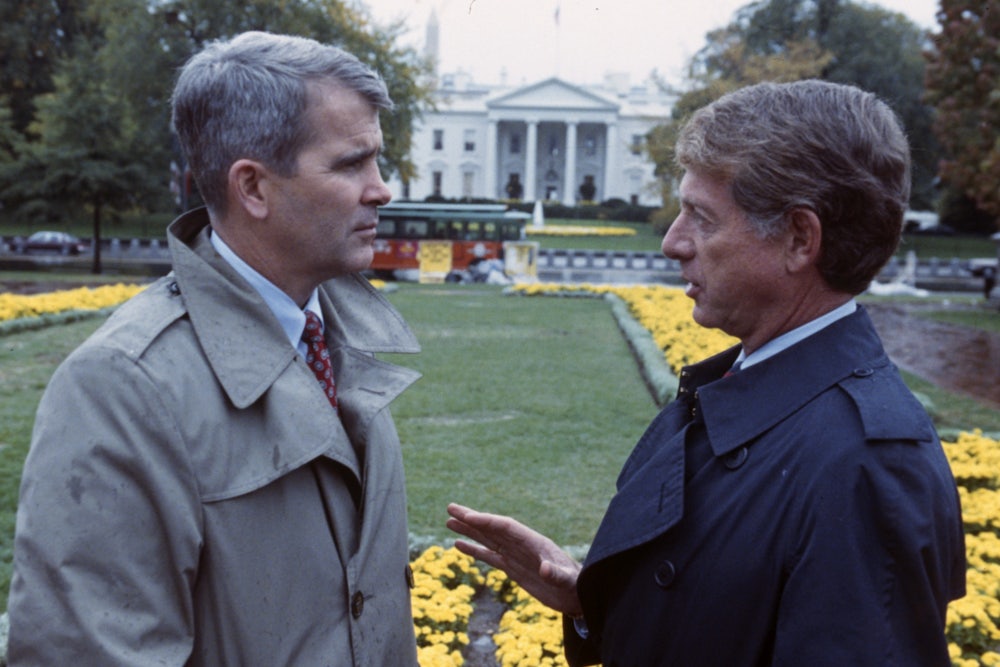These are boom times for multitasking, boom times for alienation, and, thus, boom times for content. Audiences need entertainment (give me more to do with my phone!), and capital has made the safe bet: If you build it, they (advertisers, subscribers) will come. The podcast harnesses the authority of Voice of America–style radio but updated for the spirit of our times: You choose what (and to whom) you listen. There is something for absolutely every taste (the only podcast I have listened to in its entirety is devoted to recapping episodes of The Golden Girls) and hence the fulfillment of the very contemporary desire for human connection over shared interest. There’s something so intimate about that informed whisper in the ear as you ride the subway home.
In 2017, Slate launched Slow Burn, a podcast hosted by the journalist Leon Neyfakh that walked its listeners through the Watergate scandal that culminated in Nixon’s resignation—an educational project that, in the age of Trump, seemed to contain a dash of wishful thinking. In its second season, the show explored the impeachment of Bill Clinton. (I should note that I myself currently co-host a podcast for Slate, though I have nothing to do with the production of Slow Burn.) Slow Burn is a highbrow version of the true crime podcast, one of the form’s most popular genres. It is less ethically compromised than its more lurid cousins, meant to inform more than titillate.
Neyfakh now hosts Fiasco, for the podcast network Luminary. The first season looked at the legal battle Bush v. Gore, and the newest season, which has just arrived, explores the Iran-Contra scandal, in which the Reagan administration illegally used Iranian money to arm anti-Sandinista rebels in Nicaragua. The historical format is recognizably specific to the podcast medium. Barring some mathematically satisfying anniversary or the death of a significant person, it’s hard to imagine a magazine editor willing to produce a full rehash of a story that’s history and not current event, however relevant to our times.
That seems to be the point of both Slow Burn and Fiasco. Since hindsight is 20/20, it’s no wonder we keep looking backward. The notion that Richard Nixon (or Monica Lewinsky, or Oliver North, the list is endless) might explain Donald Trump is so appealing. “Whether you support the current administration or not,” Neyfakh explains at the end of the first episode, “it has shown Americans—in dramatic fashion—that the government, at the end of the day, is really just a bunch of people. The fact that they’ve been temporarily put in charge of institutions that are much bigger than them doesn’t change that.”
Neyfakh is an adept broadcaster, an authoritative basso who does not trip over his words, even if the scripts’ long sentences might make more sense on the page than in the ear. Iran-Contra is a complicated affair, but Neyfakh trusts us to follow along, while warning early on that when it comes to Iran-Contra, “most people just don’t have a firm grasp on what happened.” Spending time with Fiasco is sort of like having someone read you The Golden Bowl as a bedtime story—can you really relax while hearing so much detail?
Fiasco’s first episode introduces us to Kevin Kattke, who seems like a character conjured by someone who’s read too much DeLillo: a Long Island Macy’s employee who ended up mixed up with the National Security Council. It’s a ripping yarn, taking us through the 1979 Communist coup in Grenada, and it’s all hard to believe even though we know it to be true. This is a tale just strange enough that there’s nowhere to file it. History has to leave out so much, and if you, like me, were a child when Reagan was in office, this might be the first you’ve heard of the Grenadian unrest and the operation to liberate American students from the island. Well, it’s the first I’ve heard of it. I appreciate that Neyfakh doesn’t make me feel dumb, then helps me be a little better informed.
There is a lot to take in, even in the first three episodes: a crash course on the Iran hostage crisis that helped tank Jimmy Carter’s presidency; the effect of America’s failures in Vietnam on its foreign policy in the 1980s; the way natural disaster brought about a political reckoning in Nicaragua; the apparatchik Oliver North using the specter of communism to persuade American blue bloods to donate to the cause of buying hand grenades for insurgents who wanted to overthrow Nicaragua’s socialist government (one donor requested naming rights for a missile). Fiasco teases out all these threads efficiently; I expect it will be able to braid them together effectively by the end.
Neyfakh’s thesis—that government is run by people just like you and me, and that telling their stories might make them, and history, easier to comprehend—is appealingly humane. But there’s something misleading about the generosity inherent in looking at North as a man simply too zealous in his convictions (in this case, that communism is the greatest evil). If we’re extrapolating to the Trump era: Does it matter what motivates the loons who abet his foreign (or domestic) policy? Does North really help us comprehend Michael Flynn or John Bolton? Is it the individual actors who are either corrupt or naïve, or the larger infrastructure of our government that is absurd? Or, worse still, are both true?
The real pleasure in Fiasco is not as a gloss on the moment but an escape from it. The stupid saga we dub Iran-Contra is long concluded, and it’s not much of a spoiler to say it was not the moral reckoning it should have been for the United States. While I was listening, I kept imagining my own children, decades from now, dipping into a podcast that spelled out one of Donald Trump’s kerfuffles. There are, after all, people who find horror entertaining.
